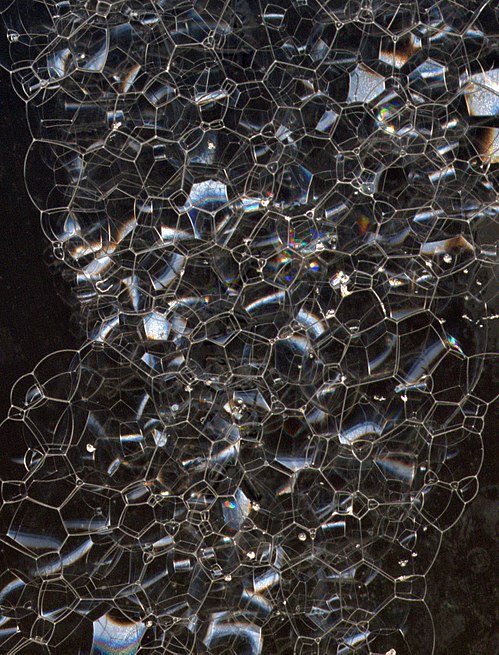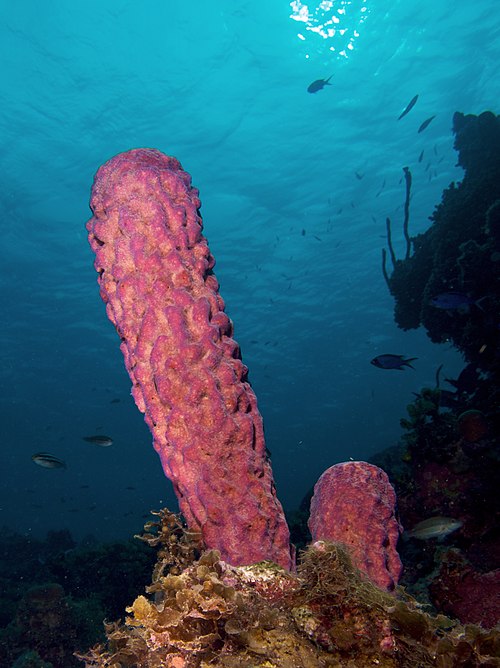Foamnoun
A substance composed of a large collection of bubbles or their solidified remains.
Foamnoun
A substance formed by trapping pockets of gas in a liquid or solid.
Foamnoun
(by extension) Sea foam; the sea.
Foamnoun
Fury.
Foamverb
(intransitive) To form or emit foam.
Foamverb
(intransitive) To spew saliva as foam, to foam at the mouth.
Foamnoun
The white substance, consisting of an aggregation of bubbles, which is formed on the surface of liquids, or in the mouth of an animal, by violent agitation or fermentation; froth; spume; scum; as, the foam of the sea.
Foamverb
To gather foam; to froth; as, the billows foam.
Foamverb
To form foam, or become filled with foam; - said of a steam boiler when the water is unduly agitated and frothy, as because of chemical action.
Foamverb
To cause to foam; as, to foam the goblet; also (with out), to throw out with rage or violence, as foam.
Foamnoun
a mass of small bubbles formed in or on a liquid
Foamnoun
a lightweight material in cellular form; made by introducing gas bubbles during manufacture
Foamverb
form bubbles;
Foamnoun
a mass of small bubbles formed on or in liquid, typically by agitation or fermentation
Foamnoun
a mass of small bubbles formed from saliva or sweat.
Foamnoun
a liquid preparation containing many small bubbles
Foamnoun
a lightweight form of rubber or plastic made by solidifying liquid foam
Foamnoun
the sea
Foamverb
form or produce a mass of small bubbles; froth
Foam
Foam is an object formed by trapping pockets of gas in a liquid or solid.A bath sponge and the head on a glass of beer are examples of foams. In most foams, the volume of gas is large, with thin films of liquid or solid separating the regions of gas.
Spongenoun
(countable) Any of various marine invertebrates, mostly of the phylum Porifera, that have a porous skeleton often of silica.
Spongenoun
(countable) A piece of porous material used for washing (originally made from the invertebrates, now often made of plastic).
Spongenoun
(uncountable) A porous material such as sponges consist of.
Spongenoun
(informal) A heavy drinker.
Spongenoun
A type of light cake.
Spongenoun
A type of steamed pudding.
Spongenoun
(slang) A person who takes advantage of the generosity of others (abstractly imagined to absorb or soak up the money or efforts of others like a sponge).
Spongenoun
(countable) A form of contraception that is inserted vaginally; a contraceptive sponge.
Spongenoun
Any sponge-like substance.
Spongenoun
(baking) Dough before it is kneaded and formed into loaves, and after it is converted into a light, spongy mass by the agency of the yeast or leaven.
Spongenoun
Iron from the puddling furnace, in a pasty condition.
Spongenoun
Iron ore, in masses, reduced but not melted or worked.
Spongenoun
A mop for cleaning the bore of a cannon after a discharge. It consists of a cylinder of wood, covered with sheepskin with the wool on, or cloth with a heavy looped nap, and having a handle, or staff.
Spongenoun
The extremity, or point, of a horseshoe, corresponding to the heel.
Spongeverb
To take advantage of the kindness of others.
Spongeverb
To get by imposition; to scrounge.
Spongeverb
(transitive) To deprive (somebody) of something by imposition.
Spongeverb
To clean, soak up, or dab with a sponge.
Spongeverb
To suck in, or imbibe, like a sponge.
Spongeverb
To wipe out with a sponge, as letters or writing; to efface; to destroy all trace of.
Spongeverb
To be converted, as dough, into a light, spongy mass by the agency of yeast or leaven.
Spongenoun
Any one of numerous species of Spongiæ, or Porifera. See Illust. and Note under Spongiæ.
Spongenoun
The elastic fibrous skeleton of many species of horny Spongiæ (Keratosa), used for many purposes, especially the varieties of the genus Spongia. The most valuable sponges are found in the Mediterranean and the Red Sea, and on the coasts of Florida and the West Indies.
Spongenoun
One who lives upon others; a pertinacious and indolent dependent; a parasite; a sponger.
Spongenoun
Any spongelike substance.
Spongenoun
A mop for cleaning the bore of a cannon after a discharge. It consists of a cylinder of wood, covered with sheepskin with the wool on, or cloth with a heavy looped nap, and having a handle, or staff.
Spongeverb
To cleanse or wipe with a sponge; as, to sponge a slate or a cannon; to wet with a sponge; as, to sponge cloth.
Spongeverb
To wipe out with a sponge, as letters or writing; to efface; to destroy all trace of.
Spongeverb
Fig.: To deprive of something by imposition.
Spongeverb
Fig.: To get by imposition or mean arts without cost; as, to sponge a breakfast.
Spongeverb
To suck in, or imbibe, as a sponge.
Spongeverb
Fig.: To gain by mean arts, by intrusion, or hanging on; as, an idler sponges on his neighbor.
Spongeverb
To be converted, as dough, into a light, spongy mass by the agency of yeast, or leaven.
Spongenoun
a porous mass of interlacing fibers the forms the internal skeleton of various marine animals and usable to absorb water or any porous rubber or cellulose product similarly used
Spongenoun
someone able to acquire new knowledge and skills rapidly and easily;
Spongenoun
a follower who hangs around a host (without benefit to the host) in hope of gain or advantage
Spongenoun
primitive multicellular marine animal whose porous body is supported by a fibrous skeletal framework; usually occurs in sessile colonies
Spongeverb
wipe with a sponge, so as to clean or moisten
Spongeverb
ask for and get free; be a parasite
Spongeverb
erase with a sponge; as of words on a blackboard
Spongeverb
soak up with a sponge
Spongeverb
gather sponges, in the ocean
Sponge
Sponges, the members of the phylum Porifera (; meaning 'pore bearer'), are a basal animal clade as a sister of the Diploblasts. They are multicellular organisms that have bodies full of pores and channels allowing water to circulate through them, consisting of jelly-like mesohyl sandwiched between two thin layers of cells.






























